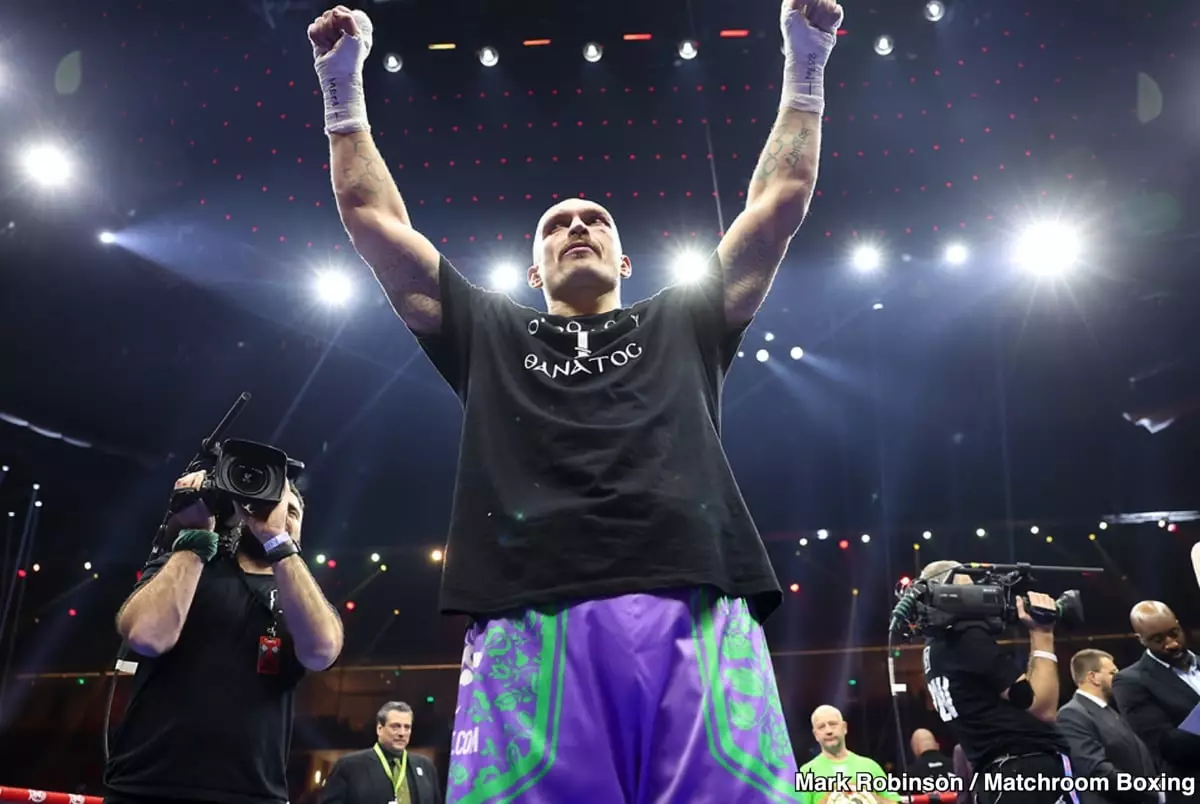The boxing world is buzzing about Oleksandr Usyk, the current heavyweight champion, who has been hailed by many as an all-time great. Analysts and sports personalities alike—including Adam Smith, Spencer Oliver, and Carl Froch—have lauded the Ukrainian pugilist’s remarkable achievements. However, there exists a contrasting viewpoint, best articulated by former champion Tim Bradley. In a recent social media exchange, Bradley firmly dismissed Usyk’s association with the label of an “all-time great,” sparking debate about what criteria should define greatness in boxing.
Usyk’s accomplishments in the ring are undeniable. He has unified both the cruiserweight and heavyweight divisions, achieving undisputed status in the former and capturing multiple titles in the latter after just seven heavyweight contests. These milestones have bolstered claims of his overwhelming skill and ability. Yet, Bradley raised some eyebrows—suggesting that such lightning-quick success does not necessarily equate to greatness. He argued that victories over elite opponents like Anthony Joshua and Tyson Fury, while impressive, don’t make a fighter an all-time great if their experience in the heavyweight ranks is relatively limited.
Critiquing Bradley’s stance, one must consider the historical context of boxing records. Many athletes have had shorter careers or less extensive competition histories yet still entered the pantheon of legends based on the impact they had during their prime. Usyk’s accomplishments, particularly in the cruiserweight division, where he dominated and became a unified champion, should be factored into the discussion. Being a two-time Olympic gold medalist and a World Amateur Boxing Championships gold medalist adds further weight to his accolades.
The primary argument posed by critics of Usyk’s status revolves around the notion of “cleaning out” a division. Bradley’s assertion that Usyk has not fully conquered the heavyweight division carries some merit; however, it requires deeper examination. Boxing is nuanced, especially in divisions that are filled with talent and potential hurdles. While it can be said that Usyk has not faced every significant contender at heavyweight, he succeeded against the top-tier names. To question whether he dodged anyone requires additional scrutiny.
Would a rematch with Daniel Dubois or a fight against Joseph Parker—if Parker defeats Dubois—be necessary for proving greatness? Perhaps, but this opens up a larger philosophical inquiry about the criteria necessary to attain “great” status. Numerous legends have faced challenges, lost, and still maintained their place in history based on their impact rather than the length of their resumés.
What truly constitutes an all-time great? Many believe that it must encompass not just the number of titles won, but also the quality of opponents faced, the manner in which victories were achieved, and long-term influence on the sport. Usyk’s skill set includes remarkable footwork, speed, and ring IQ, which have allowed him to outmaneuver larger fighters. Such attributes are often seen as a sign of greatness, even if they are assessed within a framework that traditionally rewards sustained dominance rather than immediate impact.
Moreover, a closer analysis of his amateur pedigree shows Usyk’s commitment to the sport well before turning professional. His staggering record of 335-15 as an amateur and his victories at major tournaments depict a fighter dedicated to honing his skill set. It brings forth the question of whether his early career accomplishments should also count towards defining him as one of the greatest.
Bradley’s criticism highlights a larger debate about how greatness is recognized in boxing. The sport has evolved, and so too have the standards by which boxers are judged. In earlier eras, fighters had to face more limited broadcasting and promotional frameworks; today’s champions have the opportunity to showcase their talents on global platforms, yet this does not diminish the fight’s essence or the risk it entails.
Is Usyk’s journey thus far insufficient for greatness? As boxing culture continues to grapple with its evolving definitions, it becomes increasingly important to reconsider the parameters of recognition.
While critics like Tim Bradley provide passionate arguments against Usyk’s all-time great status, the milestones achieved within a relatively short professional tenure, supported by a rich amateur background, should at least invite thoughtful consideration. What more can Usyk accomplish to earn universal acclaim? Only time, alongside unfolding boxing narratives, will answer that question. The very debate around his legacy only emphasizes the complexities of defining greatness in a sport known for its unpredictability and rich history.

